- Home
- Henry James
Travels With Henry James Page 2
Travels With Henry James Read online
Page 2
In many of these travel pieces we can catch humorous glimpses of details and elements that would find their way into James’s later works of fiction. In Saratoga, for example, the writer is forever being reminded that the superlative seems to be the natural degree of American idiom. “The piazza of the Union Hotel, I have been repeatedly informed, is the largest ‘in the world.’” His own broader experience obliges James to qualify such claims by gentle comparison: “There are a number of objects in Saratoga, by the way, which in their respective kinds are the finest in the world. One of these is Mr. John Morrissey’s casino. I bowed my head submissively to this statement, but privately I thought of the blue Mediterranean, and the little white promontory of Monaco, and the silver-gray verdure of olives, and the view across the outer sea toward the bosky cliffs of Italy.”
In Daisy Miller we hear such national braggadocio coming even from the mouths of babes: despite the loss of most of his baby teeth to dental caries, young Randolph Miller still insists that “American candy’s the best candy,” preferring it to lumps of sugar from the table d’hôte of the Trois Couronnes at Vevey.f In The Portrait of a Lady, the irrepressible New York journalist Henrietta Stackpole finds nothing in Europe that can stack up against American counterexamples: neither London nor Paris nor Rome can match “the luxury of our western cities,” she proudly boasts; even the majestic dome of St. Peter’s suffers “by comparison with that of the Capitol at Washington.”g How could Michelangelo hold a candle to Thomas U. Walter?
Subscribers to the Nation also might have appreciated the author’s subtle inside joking, when in 1870 he echoed a phrase first coined in the pages of the journal not long before. Strolling along the main avenue of Burlington, Vermont, James is favorably impressed by “the pleasant, solid American homes, with their blooming breadth of garden, sacred with peace and summer and twilight.” One of them in particular strikes his fancy, but he coyly defers ampler description of its domestic charm: “I reserve it for its proper immortality in the first chapter of the great American novel.” We must credit another Nation writer, John W. De Forest, with that legendary formulation; his brief essay, “The Great American Novel,” appeared in one of the earliest issues of 1868.h
But James redeemed this playful promise by using just such a setting in the first chapter of his (would-be) “great American novel,” Roderick Hudson (1875), which opens with a modest widow “doing the honors of an odorous cottage on a midsummer evening,” entertaining a visitor on “the rose-framed porch” of her comfortable home in Northampton, Massachusetts.i When, again in “Newport,” James “can almost imagine . . . a transient observer of the Newport spectacle dreaming momentarily of a great American novel, in which the heroine shall be infinitely realistic, and yet neither a schoolmistress nor an outcast,” he might even be anticipating the type of female protagonist that would become the consistent hallmark of his most enduring early work: Daisy Miller, in that eponymous novella, Catherine Sloper of Washington Square (1880), and Isabel Archer of The Portrait of a Lady (1881).
To be sure, an intelligent appreciation of travel encouraged Henry James to put a high premium on the virtues of literary realism. It is worth mentioning that his other notable contemporaries, Mark Twain and William Dean Howells, also spent formative years in Europe at the earliest stages of their respective careers—an experience that keenly sharpened their awareness of distinctive cultural traits, manners, and habits of speech and helped them to dispel the kinds of romanticized impressions to which “innocents abroad” especially were prone.
Likewise wary of that tendency, James famously acknowledged (in an 1872 letter), “It’s a complex fate, being an American, and one of the responsibilities it entails is fighting against a superstitious valuation of Europe.”j The experience of travel was, perhaps, the best safeguard. As James concluded in “Homburg Reformed” (1873), “The observations of the ‘cultivated American’ bear chiefly, I think, upon the great topic of national idiosyncrasies. He is apt to have a keener sense of them than Europeans; it matters more to his imagination that his neighbor is English, French, or German. He often seems to me to be a creature wandering aloof, but half naturalized himself. His neighbors are outlined, defined, imprisoned, if you will, by their respective national moulds, pleasing or otherwise; but his own type has not hardened yet into the Old-World bronze.”
In his travel writing collected here, as elsewhere, the touchstone for Henry James is freedom.
a Henry James, “The Deathbed Dictation,” in Henry James Letters, ed. Leon Edel, 4 vols. (Cambridge, MA: Belknap Press of Harvard University Press, 1974–1984), 4:811.
b Disclosed in the first of his autobiographical volumes, Henry James, A Small Boy and Others, ed. Peter Collister (1913; rpt. Charlottesville: University of Virginia Press, 2011).
c James, A Small Boy and Others, 46.
d Henry James Sr. to Ralph Waldo Emerson, August 31, 1849, in Ralph Barton Perry, The Thought and Character of William James, 2 vols. (Boston: Little, Brown, 1935) 1:59.
e Henry James to William James, October 30, [1869], Edel, Henry James Letters, 1:160.
f Henry James, “Daisy Miller: A Study,” in Complete Stories, 1874–1884 (New York: Library of America, 1999), 240.
g Henry James, The Portrait of a Lady, in Novels, 1881–1886 (New York: Library of America, 1985), 413, 493.
h John W. De Forest, “The Great American Novel,” Nation 6 (January 9, 1868): 27–29.
i Henry James, Roderick Hudson, in Novels, 1871–1880 (New York: Library of America, 1983), 168.
j Henry James to Charles Eliot Norton, February 4, 1872, in Edel, Henry James Letters, 1:274.
SARATOGA
August 3, 1870
Map of Saratoga Springs, ca. 1888.
ONE HAS VAGUE IRRESPONSIBLE LOCAL PREVISIONS OF which it is generally hard to discern the origin. You find yourself thinking of an unknown, unseen place as thus rather than so. It assumes in your mind a certain shape, a certain color which frequently turns out to be singularly at variance with reality. For some reason or other, I had idly dreamed of Saratoga as buried in a sort of elegant wilderness of verdurous gloom. I fancied a region of shady forest drives, with a bright, broad-piazzaed hotel gleaming here and there against a background of mysterious groves and glades. I had made a cruelly small allowance for the stern vulgarities of life—for the shops and sidewalks and loafers, the complex machinery of a city of pleasure. The fault was so wholly my own that it is quite without bitterness that I proceed to affirm that the Saratoga of experience is sadly different from this. I confess, however, that it has always seemed to me that one’s visions, on the whole, gain more than they lose by realization. There is an essential indignity in indefiniteness: you cannot imagine the especial poignant interest of details and accidents. They give more to the imagination than they receive from it. I frankly admit, therefore, that I find here a decidedly more satisfactory sort of place than the all-too-primitive Elysium of my wanton fancy. It is indeed, as I say, immensely different. There is a vast number of brick—nay, of asphalte—sidewalks, a great many shops, and a magnificent array of loafers. But what indeed are you to do at Saratoga—the morning draught having been achieved—unless you loaf? “Que faire en un gîte à moins que l’on ne songe?” Loafers being assumed, of course shops and sidewalks follow. The main avenue of Saratoga is in fact bravely entitled Broadway. The untravelled reader may form a very accurate idea of it by recalling as distinctly as possible, not indeed the splendors of that famous thoroughfare, but the secondary charms of the Sixth Avenue. The place has what the French would call the “accent” of the Sixth Avenue. Its two main features are the two monster hotels which stand facing each other along a goodly portion of its course. One, I believe, is considered much better than the other—less prodigious and promiscuous and tumultuous, but in appearance there is little choice between them. Both are immense brick structures, directly on the crowded, noisy street, with vast covered piazzas running along the façade, supported by great i
ron posts. The piazza of the Union Hotel, I have been repeatedly informed, is the largest “in the world.” There are a number of objects in Saratoga, by the way, which in their respective kinds are the finest in the world. One of these is Mr. John Morrissey’s casino. I bowed my head submissively to this statement, but privately I thought of the blue Mediterranean, and the little white promontory of Monaco, and the silver-gray verdure of olives, and the view across the outer sea toward the bosky cliffs of Italy. Congress Spring, too, it is well known, is the most delicious mineral spring in the known universe; this I am perfectly willing to maintain.
The piazzas of these great hotels may very well be the greatest of all piazzas. They are not picturesque, but they doubtless serve their purpose—that of affording sitting-space in the open air to an immense number of persons. They are, of course, quite the best places to observe the Saratoga world. In the evening, when the “boarders” have all come forth and seated themselves in groups, or have begun to stroll in (not always, I regret to say, to the sad detriment of the dramatic interest, bisexual) couples, the vast heterogeneous scene affords a great deal of entertainment. Seeing it for the first time, the observer is likely to assure himself that he has neglected an important feature in the sum of American manners. The rough brick wall of the house, illumined by a line of flaring gas-lights, forms a harmonious background to the crude, impermanent, discordant tone of the assembly. In the larger of the two hotels, a series of long windows open into an immense parlor—the largest, I suppose, in the world—and the most scantily furnished, I imagine, in proportion to its size. A few dozen rocking-chairs, an equal number of small tables, tripods to the eternal ice-pitchers, serve chiefly to emphasize the vacuous grandeur of the spot. On the piazza, in the outer multitude, ladies largely prevail, both by numbers and (you are not slow to perceive) by distinction of appearance. The good old times of Saratoga, I believe, as of the world in general, are rapidly passing away. The time was when it was the chosen resort of none but “nice people.” At the present day, I hear it constantly affirmed, “the company is dreadfully mixed.” What society may have been at Saratoga when its elements were thus simple and severe, I can only vaguely, regretfully conjecture. I confine myself to the dense, democratic, vulgar Saratoga of the current year. You are struck, to begin with, at the hotels by the numerical superiority of the women; then, I think, by their personal superiority. It is incontestably the case that in appearance, in manner, in grace and completeness of aspect, American women vastly surpass their husbands and brothers. The case is reversed with most of the nations of Europe—with the English notably, and in some degree with the French and Germans. Attached to the main entrance of the Union Hotel, and adjoining the ascent from the street to the piazza, is a “stoop” of mighty area, which, at most hours of the day and morning, is a favored lounging-place of men. I am one of those who think that on the whole we are a decidedly good-looking people. “On the whole,” perhaps, every people is good-looking. There is, however, a type of physiognomy among ourselves which seems so potently to imperil the modest validity of this dictum, that one finally utters it with a certain sense of triumph. The lean, sallow, angular Yankee of tradition is dignified mainly by a look of decision, a hint of unimpassioned volition, the air of “smartness.” This in some degree redeems him, but it fails to make him handsome. But in the average American of the present time, the typical leanness and sallowness are less, and the individual keenness and smartness at once equally intense and more evenly balanced with this greater comeliness of form. Casting your eye over a group of your fellow-citizens in the portico of the Union Hotel, you will be inclined to admit that, taking the good with the bad, they are worthy sons of the great Republic. I find in them, I confess, an ample fund of grave entertainment. They suggest to my fancy the swarming vastness—the multifarious possibilities and activities—of our young civilization. They come from the uttermost ends of the continent—from San Francisco, from New Orleans, from Duluth. As they sit with their white hats tilted forward, and their chairs tilted back, and their feet tilted up, and their cigars and toothpicks forming various angles with these various lines, I imagine them surrounded with a sort of clear achromatic halo of mystery. They are obviously persons of experience—of a somewhat narrow and monotonous experience certainly; an experience of which the diamonds and laces which their wives are exhibiting hard by are, perhaps, the most substantial and beautiful result; but, at any rate, they are men who have positively actually lived. For the time, they are lounging with the negro waiters, and the boot-blacks, and the news-venders; but it was not in lounging that they gained their hard wrinkles and the level impartial regard which they direct from beneath their hat-rims. They are not the mellow fruit of a society impelled by tradition and attended by culture; they are hard nuts, which have grown and ripened as they could. When they talk among themselves, I seem to hear the mutual cracking of opposed shells.
If these men are remarkable, the ladies are wonderful. Saratoga is famous, I believe, as the place of all places in America where women most adorn themselves, or as the place, at least, where the greatest amount of dressing may be seen by the greatest number of people. Your first impression is therefore of the—what shall I call it?—of the muchness of the feminine drapery. Every woman you meet, young or old, is attired with a certain amount of splendor and a large amount of good taste. You behold an interesting, indeed a quite momentous spectacle: the democratization of elegance. If I am to believe what I hear—in fact, I may say what I overhear—a large portion of these sumptuous persons are victims of imperfect education and members of a somewhat narrow social circle. She walks more or less of a queen, however, each unsanctified nobody. She has, in dress, an admirable instinct of elegance and even of what the French call “chic.” This instinct occasionally amounts to a sort of passion; the result then is superb. You look at the coarse brick walls, the rusty iron posts of the piazza, at the shuffling negro waiters, the great tawdry steamboat cabin of a drawing-room—you see the tilted ill-dressed loungers on the steps—and you finally regret that a figure so exquisite should have so vulgar a setting. Your resentment, however, is speedily tempered by reflection. You feel the impertinence of your old reminiscences of Old-World novels, and of the dreary social order in which privacy was the presiding genius and women arrayed themselves for the appreciation of the few—the few still, even when numerous. The crowd, the tavern loungers, the surrounding ugliness and tumult and license, constitute the social medium of the young lady whom you so cunningly admire: she is dressed for publicity. The thought fills you with a kind of awe. The Old-World social order is far away indeed, and as for Old-World novels, you begin to doubt whether she is so amiably curious as to read even the silliest of them. To be so excessively dressed is obviously to give pledges to idleness. I have been forcibly struck with the apparent absence of any warmth and richness of detail in the lives of these wonderful ladies of the piazzas. We are freely accused of being an eminently wasteful people: I know of few things which so largely warrant the accusation as the fact that these consummate élégantes adorn themselves, socially speaking, to so little purpose. To dress for every one is, practically, to dress for no one. There are few prettier sights than a charmingly dressed woman, gracefully established in some shady spot, with a piece of needlework or embroidery, or a book. Nothing very serious is accomplished, probably, but an aesthetic principle is considered. The embroidery and the book are a tribute to culture, and I suppose they really figure somewhere out of the opening scenes of French comedies. But here at Saratoga, at any hour of morning or evening, you may see a hundred brave creatures steeped in a quite unutterable empty handedness. I have had constant observation of a lady who seems to me really to possess a genius for being nothing more than dressed. Her dresses are admirably rich and beautiful—my letter would greatly gain in value if I possessed the learning needful for describing them. I can only say that every evening for a fortnight, I believe, she has revealed herself as a fresh creation. But she espe
cially, as I say, has struck me as a person dressed beyond her life. I resent on her behalf—or on behalf at least of her finery—the extreme severity of her circumstances. What is she, after all, but a regular boarder? She ought to sit on the terrace of a stately castle, with a great baronial park shutting out the undressed world, mildly coquetting with an ambassador or a duke. My imagination is shocked when I behold her seated in gorgeous relief against the dusty clapboards of the hotel, with her beautiful hands folded in her silken lap, her head drooping slightly beneath the weight of her chignon, her lips parted in a vague contemplative gaze at Mr. Helmbold’s well-known advertisement on the opposite fence, her husband beside her reading the New York Sun.
I have indeed observed cases of a sort of splendid social isolation here, which are not without a certain amount of pathos—people who know no one—who have money and finery and possessions, only no friends. Such at least is my inference, from the lonely grandeur with which I see them invested. Women, of course, are the most helpless victims of this cruel situation, although it must be said that they befriend each other with a generosity for which we hardly give them credit. I have seen women, for instance, at various “hops,” approach their lonely sisters and invite them to waltz, and I have seen the fair invited most graciously heedless of the potential irony of this particular form of charity. Gentlemen at Saratoga are at a premium far more, evidently, than at European watering-places. It is an old story that in this country we have no leisured class—the class from which the Saratogas of Europe recruit a large number of their male frequenters. A few months ago, I paid a visit to a famous English watering-place, where, among many substantial points of difference from our own, I chiefly remember the goodly number of well-dressed, well-looking, well-talking young men. While their sweethearts and sisters are waltzing together, our own young men are rolling up greenbacks in counting-houses and stores. I was recently reminded in another way, one evening, of the unlikeness of Saratoga to Cheltenham. Behind the biggest of the big hotels is a large planted yard, which has come to be talked of as a “park.” This I regret, inasmuch as, as a yard, it is possibly the biggest in the world; while as a park I am afraid it is decidedly less than the smallest. At one end, however, stands a great ball-room, approached by a range of wooden steps. It was late in the evening: the room, in spite of the intense heat, was blazing with light, and the orchestra thundering a mighty waltz. A group of loungers, including myself, were hanging about to watch the ingress of the festally minded. In the basement of the edifice, sunk beneath the ground, a noisy auctioneer, in his shirt and trousers, black in the face with heat and vociferation, was selling “pools” of the races to a dense group of frowsy betting-men. At the foot of the steps was stationed a man in a linen coat and straw hat, without waistcoat or cravat, to take the tickets of the ball-goers. As the latter failed to arrive in sufficient numbers, a musician came forth to the top of the steps and blew a loud summons on a horn. After this they began to straggle along. On this occasion, certainly, the company promised to be decidedly “mixed.” The women, as usual, were a great deal dressed, though without any constant adhesion to the technicalities of full-dress. The men adhered to it neither in the letter nor the spirit. The possessor of a pair of satin shod feet, twinkling beneath an uplifted volume of gauze and lace and flowers, tripped up the steps with her gloved hand on the sleeve of a railway “duster.” Now and then two ladies arrived alone: generally a group of them approached under convoy of a single man. Children were freely scattered among their elders, and frequently a small boy would deliver his ticket and enter the glittering portal, beautifully unembarrassed. Of the children of Saratoga there would be wondrous things to relate. I believe that, in spite of their valuable aid, the festival of which I speak was rated rather a “fizzle.” I see it advertised that they are soon to have, for their own peculiar benefit, a “Masquerade and Promenade Concert, beginning at 9 p.m.” I observe that they usually open the “hops,” and that it is only after their elders have borrowed confidence from the sight of their unfaltering paces that they venture to perform. You meet them far into the evening roaming over the piazzas and corridors of the hotels—the little girls especially—lean, pale, and formidable. Occasionally childhood confesses itself, even when motherhood stands out, and you see at eleven o’clock at night some poor little bedizened precocity collapsed in slumbers in a lonely wayside chair. The part played by children in society here is only an additional instance of the wholesale equalization of the various social atoms which is the distinctive feature of collective Saratoga: A man in a “duster” at a ball is as good as a man in irreproachable sable; a young woman dancing with another young woman is as good as a young woman dancing with a young man; a child of ten is as good as a woman of thirty; a double negative in conversation is rather better than a single.

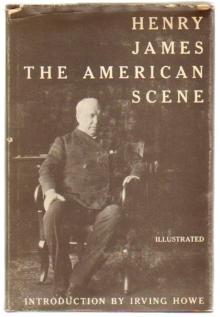 The American
The American The Wings of the Dove, Volume 1 of 2
The Wings of the Dove, Volume 1 of 2 Frost at Midnight
Frost at Midnight Morning Frost
Morning Frost The Portrait of a Lady — Volume 1
The Portrait of a Lady — Volume 1 Fatal Frost
Fatal Frost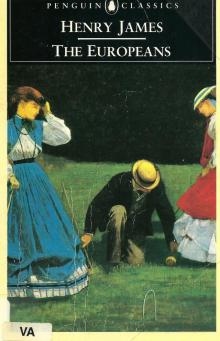 The Europeans
The Europeans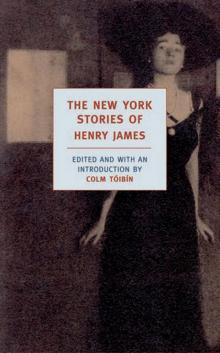 The New York Stories of Henry James
The New York Stories of Henry James Great Short Novels of Henry James
Great Short Novels of Henry James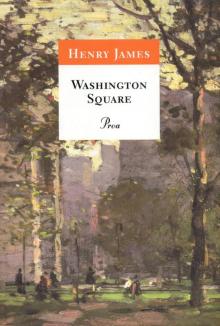 Washington Square
Washington Square The Portrait of a Lady — Volume 2
The Portrait of a Lady — Volume 2 The Ambassadors
The Ambassadors The Wings of the Dove
The Wings of the Dove The Princess Casamassima (Classics)
The Princess Casamassima (Classics) The Coxon Fund
The Coxon Fund First Frost
First Frost Henry James
Henry James The Daily Henry James
The Daily Henry James Travels With Henry James
Travels With Henry James The Reverberator: A Novel
The Reverberator: A Novel What Maisie Knew (Henry James Collection)
What Maisie Knew (Henry James Collection) The Outcry
The Outcry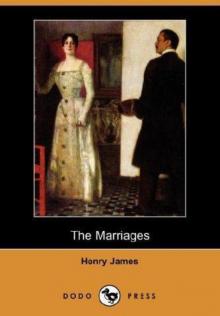 The Marriages
The Marriages The Wings of the Dove, Volume 2
The Wings of the Dove, Volume 2 The Bostonians, Vol. I
The Bostonians, Vol. I The Outcry: -1911
The Outcry: -1911 The Complete Works of Henry James
The Complete Works of Henry James Letters from the Palazzo Barbaro
Letters from the Palazzo Barbaro The Pupil
The Pupil The Bostonians, Vol. II
The Bostonians, Vol. II Pandora
Pandora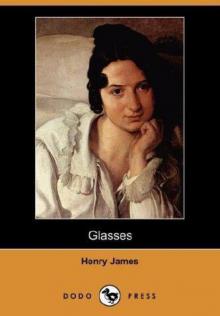 Glasses
Glasses The Princess Casamassima
The Princess Casamassima What Maisie Knew
What Maisie Knew The Reverberator
The Reverberator The Golden Bowl - Complete
The Golden Bowl - Complete Confidence
Confidence Wings of the Dove (Barnes & Noble Classics Series)
Wings of the Dove (Barnes & Noble Classics Series) The Spoils of Poynton
The Spoils of Poynton